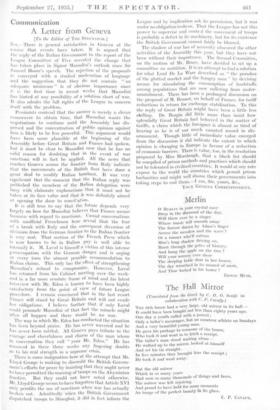Communication
A Letter from Geneva
[To the Editor of THE SPECTATOR.] Sett,—There is general satisfaction in Geneva at the course that events have taken. It is argued that the reply of the Italian Government to the report of the League Committee of Five revealed the change that has taken place in Signor Mussolini's outlook since Sir Samuel Hoare's speech. The rejection of the proposals is conveyed with a studied moderation of language and the suggestion that they do not contain " an adequate minimum " is of obvious importance since it is the first time in recent weeks that Mussolini has hinted at any possibility of R solution short of war. It also admits the full rights of the League to concern itself with the problem. Pessimists contend that the answer is merely a clever manoeuvre to obtain time, that Mussolini wants the negotiations to continue until the Assembly has dis- persed and the concentration of public opinion against him is likely to be less powerful. This argument would have been more plausible at the beginning of the Assembly before Great Britain and France had spoken, but it must be clear to Mussolini now that he has no solid reason for doubting that in the event of war sanctions will in fact be applied. All the news that reaches Geneva across the frontier from Italy indicate that the movements of the British fleet have done a great deal to modify Italian bombast. It was very significant that the moment that the Italian reply was published the members of the Italian delegation were busy with elaborate explanations that it must not be taken at its face value and that it was definitely aimed at opening the door to concil'ation. It is still true to say that the future depends very largely on how far 'Mussolini believes that France means business with regard to sanctions. Casual conversations with unofficial Frenchmen here reveal that the fear of a break with Italy and the consequent diversion of divisions from the German .frontier to the Italian frontier is very real. That section of the French Press which is now known to be in Italian pay is well able to intensify it. M. Laval is himself a victim of this intense preoccupation with the German danger and is urging at every turn the utmost possible accommodation to Italian claims. This only has the effect of strengthening Mussolini's refusal to compromise. However, Laval has returned from his Cabinet meeting over the week- end in a far more resolute frame of mind and his latest interview with Mr. Eden is known to have been highly satisfactory from the point of view of future League procedure. I remain convinced that in the last resort Vrance will stand by Great Britain and will not evade her obligations. I believe further that if only Laval could persuade Mussolini of that fact the miracle might after all happen and there would be no war, The way in which Mr. Eden has conchicted the situation has been beyond praise. He has never wavered and he has never been rattled. All Geneva pays tribute to the Courage and cheerfulness and charm of the man whom in conversation they call " your Mr. Eden." He has removed in these three weeks any lingering doubts as to his real strength in a supreme crisis. There is some indignation here at the attempt that Mr. Lloyd George is making to discredit the British Govern- ment's efforts for peace by insisting that they ought never to have permitted the massing of troops on the Abyssinian frontier. But they could not have acted otherwise. Mr. Lloyd George seems to have forgotten that Article XVI only pertifits the use of sanctions when war has actually broken out. Admittedly when the 'British Government dispatched troops to Shanghai, it did in fv,ct inform the League and by implication ask its permission, but it was under- no obligation to do so. That the League has not this power to supervise and contr31 the movement of troops is probably a defect in its machinery, but for its existence the British Government cannot fairly be blamed.
The shadow of war has of necessity obscured the other activities of the Assembly this year, birt they have not been without their importance. The Second Committee, on the motion of Mr. Bruce, have decided to set up a committee on nutrition. It is an attempt to find a solution for what Lord De La Warr described as " the paradox- of the glutted market and the hungry man " by devising means for stimulating the consumption of foodstuffs among populations that are now suffering from under- nourishment. There has been a prolonged discussion on the proposal of M. Bonnet, on behalf of France, for tariff reductions in return for exchange stabilisation. To this the reply of Great Britain might have been a little less chilling. Dr. Burgin did little more than insist how splendidly Great Britain had behaved in the matter of tariffs, a claim which the foreigner is almost as tired of hearing as he is of our much vaunted record in dis- armament. Though little of immediate value emerged from the discussion it did indicate the extent to which opinion is changing in Europe in favour of a reduction of economic barriers. There is value, too, in the resolution proposed by Miss Horsbrugh, that a black list should be compiled of prison methods and practices which should not be tolerated in civilised countries. It would at any rate expose to the world the countries which permit prison barbarities and might well shame their governments into taking steps to end them.—I am, Sir, yours, &c., YOUR GENEVA CORRESPONDENT.














































 Previous page
Previous page